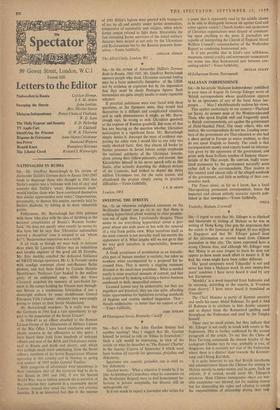SIR,—In his review of Alexander Dallin's German Rule in Russia,
1941-1945, Mr. Geoffrey Barraclough answers people who think Ukrainian national feeling may be a force potentially disruptive of the USSR not by evidence or argument but by the imputation that they must be 'shady Pentagon figures. Such innuendoes are quite simply insults to many reputable scholars.
If practical politicians were ever faced with these questions, as the Germans were, they would find themselves in a difficult and complicated situation, and M such circumstances it might, as Mr. Barra- dough says, be wrong to seek Ukrainian goodwill at the expense of Russian goodwill. But none of that has any bearing on the question whether Ukrainian nationalism is a significant force. Mr. Barraclough simply denies it. Amongst the mass of evidence sup- porting the other view would like to cite only two easily checked facts: first, that almost all books by former prisoners in Soviet labour camps emphasise the national solidarity of the Ukrainian inmates, alone among their fellow-prisoners; and second, that Khrushchev himself in his secret speech tells us that Stalin, after actually deporting the disloyal nations of the Caucasus, had wished to deport the thirty million Ukrainians too, for the same reason, and abandoned the project simply owing to practical difficulties.—Yours faithfully, J. E. M. ARDEN London, SW3


































 Previous page
Previous page